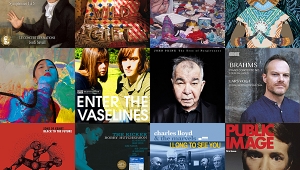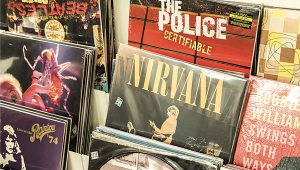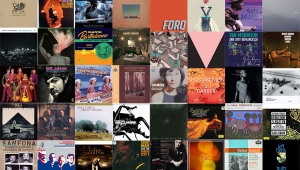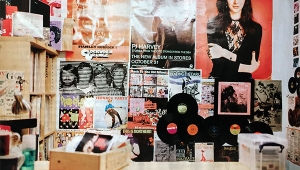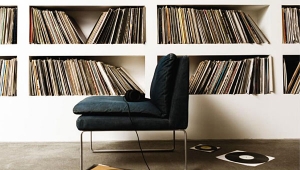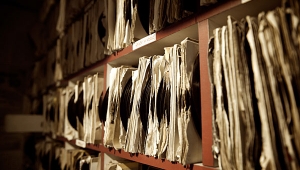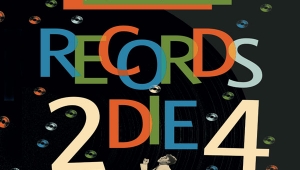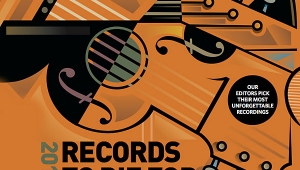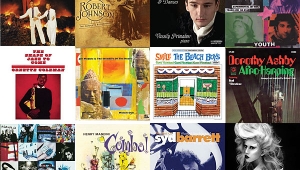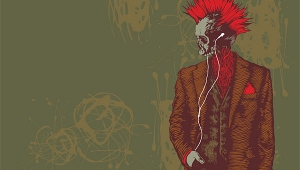| Columns Retired Columns & Blogs |
1993 Records To Die For Page 7
Richard Lehnert
JOE HENRY: Shuffletown
Joe Henry, vocals, acoustic & resonator guitars; David Mansfield, violin, mandolin, resonator guitar; Cecil McBee, upright bass; Phil Kelly, piano, organ; Michael Blair, percussion, vibes, vocals; T-Bone Burnett, resonator guitar, snare & brushes; Charlie Giordano, accordian, organ; Don Cherry, trumpet, Jews' harp
A&M 75021 5315 2 (CD only). T-Bone Burnett, prod.; Rik Pekkonen, eng. AAD. TT: 41:22
It was close---last month I almost named this three-year-old album Stereophile's "Recording of the Month" over its successor, Joe Henry's brand-new, almost-as-good Short Man's Room. Yes, Shuffletown is that good: a dozen dark, brooding songs written with awesome intelligence and deep feeling, and sung entirely without pretension or vocal technique for its own sake; songs about the forgotten corners of rural and small-town America; songs of loss, regret, and joy; songs that sound as if they cost their singer dearly. Henry's sort of a male Robin Holcomb---if ever a set of folk/rock singer/songwriter lyrics could survive being from their music's womb untimely ripp'd, these be them. But the music's just as good as the words (check out those sidemen!), and, confounding Holt's First Law, the sound's even better: this all-acoustic session was recorded live in the studio, direct to two-track analog, and boy, does it re-create that live-in-the-living-room feel. Henry doesn't sell too many discs, so pick this up before A&M decides to pull the plug. Really special.
VELJO TORMIS: Forgotten Peoples
Tõnu Kaljuste, Estonian Philharmonic Chamber Choir
ECM New Series 1459/60 (434 275-2, 2 CDs only). Paul Hillier, prod.; Peter Laenger, eng. DDD. TT: 2:06:01
What a sobering delight this is: two hours of unaccompanied chorus singing Veljo Tormis's entirely unsentimental arrangements of the traditional songs of six dying cultures from the landlocked interior where Finland, Estonia, Latvia, and Russia meet. Tõnu Kaljuste directs the Estonian Philharmonic Chamber Choir with passion and discipline, and the sound is of absolute reference quality for a recording of acappella voices in a churchly venue. Spend enough time with this one and it will change you---for the better. (XV-8)
Guy Lemcoe
GABBY PAHINUI: Gabby
Panini Records PS-1002 (LP only). Steve Siegfried, Lawrence Brown, Witt Shingle, prods.; Robert Lang, eng. AAA. TT: 51:00
An album of music as relaxing and enjoyable as a backyard barbecue with a handful of good buddies. I don't understand a word of the lyrics, but when Hawaiian Gabby, his four sons, and their two closest friends sing and play their guitars and basses, I get the message. If you view music as an extension of life, you will too. As soon as the stylus settles into the first groove, you'll hear what analogaholics have been talking about all these years. If there's a "warmer" or more natural recording of such music, I don't know about it. A treat for fans of acoustic roots music.
USTAD ALI AKBAR KHAN: Indian Architexture
Ustad Ali Akbar Khan, sarod; Sri Swapan Chaudhuri, tabla; James Pomerantz, David Trasoff, tanpuras
Water Lily Acoustics WLA-ES-20 (2 LPs), WLA-ES-20-CD (2 CDs). Kavichandran Alexander, eng. & prod.; Sallie Reynolds, co-prod. AAA/AAD. TT: 111:36
A stunning recital of North Indian classical music preserved in a recording so realistic you'll swear you're right inside the chapel where it took place. If you've hesitated to explore classical music outside Western traditions, do so no longer and buy this recording. It will expose you to music which is sublimely spiritual, yet firmly rooted in human experience. For those who care to listen, an aural document of a man baring his soul through music. Become one of Khan's audience.
Robert Levine
R. STRAUSS: Die Frau ohne Schatten
Hildegard Behrens, Julia Varady, PlÁcido Domingo, José van Dam, Reinhild Runkel, Sumi Jo; others; Vienna Philharmonic, Sir Georg Solti
London 436 243-2 (3 CDs only). Christopher Raeburn, Morten Winding, Stephen Trainor, prods.; James Lock, John Pellowe, Jonathan Stokes, Philip Siney, engs. DDD. TT: 3:15:28
Although this recording is new, it's already a classic; it's miraculous, both as a performance and as sheer sound, and does justice to this rich and complicated work.
WAGNER: Lohengrin
Jess Thomas, Elisabeth Grümmer, Christa Ludwig, Dietrich Fischer-Dieskau, Gottlob Frick, others; Vienna Philharmonic, Rudolf Kempe
>EMI CDCC 49017 (3 CDs only). Victor Olof, prod. ADD. TT: 3:38:36
This Lohengrin has yet to be bettered on disc, even after almost 30 years. Elisabeth Grümmer's Elsa somehow manages to be ethereal and totally real, and she is flawlessly foiled by the nasty, dark, yet vocally alluring Ortrud of Christa Ludwig. Jess Thomas sings Lohengrin's music beautifully, if without the ability to transport us to another place, and Fischer-Dieskau's Telramund is both weak and dangerous---a figure damned. Frick's Heinrich is authoritative and important. Kempe's leadership is magical---the score shimmers, but the drama works. The Vienna forces and the recording itself are terrific. You can't do better. (XIV-1)
Lewis Lipnick
SIR GRANVILLE BANTOCK: Celtic Symphony, The Witch of Atlas, The Sea Reivers, A Hebridean Symphony
Vernon Handley, Royal Philharmonic
Hyperion CDA66450 (CD only). Tony Faulkner, eng.; Martin Compton, prod. DDD. TT: 73:30
Granville Bantock (1868-1946) was a prolific English composer heavily influenced by the music of Debussy, Liszt, Wagner, Strauss, and, particularly, Sibelius. Of the four works on this disc, the Celtic and Hebridean Symphonies stand out sharply. The Celtic is scored for full string orchestra (written in seven parts) and six harps (!). This is the epitome of English string writing, the equal of Vaughan Williams's Fantasia on a Theme of Thomas Tallis. The Hebridean is large, romantic, and terribly exciting, reminiscent of the grandest of Richard Strauss's works in its use---without becoming bloated or overly complex---of the symphony orchestra's various instrumental colors. This is one of the greatest orchestral works in the English romantic repertoire. It doesn't exhibit the milktoast blahs so common to similar works from the British Isles, instead sounding more like a hybrid of Strauss and Sibelius. This recording is a sonic knockout, a must buy for anyone who likes great recordings and opulent instrumentation.
SHOSTAKOVICH: Symphonies 4 & 8
Mstislav Rostropovich, National Symphony
Symphony 4: Teldec 9031-76261-2 (CD only). Ulrich Ruscher, eng.; Martin Fouqué, prod. DDD. TT: 64:34
Symphony 8: Teldec 9031-74719-2 (CD only). Michael Brammann, eng.; Martin Fouqué, prod. DDD. TT: 61:16
I know we're supposed to keep our recommended recordings to a maximum of two, and I also know that blowing your own horn is not necessarily in good taste, but I just had to tell you about these two fabulous new recordings. I should first compliment the Teldec recording team, the first people to ever realistically capture the power and weight of our orchestra. Since I played in both of these performances, I can tell you that no one else on the planet knows the music of Shostakovich like Rostropovich. These hair-raising, goosebump-producing performances will leave you in a state of shock. Symphony 8 is about war and all of its horrors. It's my favorite Shostakovich symphony, and this recording is the first to do it justice. After we performed the 8th in Leningrad in 1990, I was told by some listeners that our rendition was the most intense and emotional ever heard in that city. Symphony 4 is just as intense, but much more bitingly sarcastic and schizophrenically Mahleresque than anything else Shostakovich ever composed. Teldec chose a slightly more distant and atmospheric perspective for 8, and a brighter, more forward sound for 4. This is as it should be, since 8 is a bigger, more sweeping score than the episodic, somewhat introspective 4. These are both the finest recorded performances available (even if I do say so myself), and a must-have for the listener who wants earth-shaking dynamics, spacious natural soundstage, and the deepest look so far into the troubled soul of a very misunderstood and underrated composer.

JOE HENRY: Shuffletown
Joe Henry, vocals, acoustic & resonator guitars; David Mansfield, violin, mandolin, resonator guitar; Cecil McBee, upright bass; Phil Kelly, piano, organ; Michael Blair, percussion, vibes, vocals; T-Bone Burnett, resonator guitar, snare & brushes; Charlie Giordano, accordian, organ; Don Cherry, trumpet, Jews' harp
A&M 75021 5315 2 (CD only). T-Bone Burnett, prod.; Rik Pekkonen, eng. AAD. TT: 41:22
It was close---last month I almost named this three-year-old album Stereophile's "Recording of the Month" over its successor, Joe Henry's brand-new, almost-as-good Short Man's Room. Yes, Shuffletown is that good: a dozen dark, brooding songs written with awesome intelligence and deep feeling, and sung entirely without pretension or vocal technique for its own sake; songs about the forgotten corners of rural and small-town America; songs of loss, regret, and joy; songs that sound as if they cost their singer dearly. Henry's sort of a male Robin Holcomb---if ever a set of folk/rock singer/songwriter lyrics could survive being from their music's womb untimely ripp'd, these be them. But the music's just as good as the words (check out those sidemen!), and, confounding Holt's First Law, the sound's even better: this all-acoustic session was recorded live in the studio, direct to two-track analog, and boy, does it re-create that live-in-the-living-room feel. Henry doesn't sell too many discs, so pick this up before A&M decides to pull the plug. Really special.
VELJO TORMIS: Forgotten Peoples
Tõnu Kaljuste, Estonian Philharmonic Chamber Choir
ECM New Series 1459/60 (434 275-2, 2 CDs only). Paul Hillier, prod.; Peter Laenger, eng. DDD. TT: 2:06:01
What a sobering delight this is: two hours of unaccompanied chorus singing Veljo Tormis's entirely unsentimental arrangements of the traditional songs of six dying cultures from the landlocked interior where Finland, Estonia, Latvia, and Russia meet. Tõnu Kaljuste directs the Estonian Philharmonic Chamber Choir with passion and discipline, and the sound is of absolute reference quality for a recording of acappella voices in a churchly venue. Spend enough time with this one and it will change you---for the better. (XV-8)
Guy Lemcoe
GABBY PAHINUI: Gabby
Panini Records PS-1002 (LP only). Steve Siegfried, Lawrence Brown, Witt Shingle, prods.; Robert Lang, eng. AAA. TT: 51:00
An album of music as relaxing and enjoyable as a backyard barbecue with a handful of good buddies. I don't understand a word of the lyrics, but when Hawaiian Gabby, his four sons, and their two closest friends sing and play their guitars and basses, I get the message. If you view music as an extension of life, you will too. As soon as the stylus settles into the first groove, you'll hear what analogaholics have been talking about all these years. If there's a "warmer" or more natural recording of such music, I don't know about it. A treat for fans of acoustic roots music.
USTAD ALI AKBAR KHAN: Indian Architexture
Ustad Ali Akbar Khan, sarod; Sri Swapan Chaudhuri, tabla; James Pomerantz, David Trasoff, tanpuras
Water Lily Acoustics WLA-ES-20 (2 LPs), WLA-ES-20-CD (2 CDs). Kavichandran Alexander, eng. & prod.; Sallie Reynolds, co-prod. AAA/AAD. TT: 111:36
A stunning recital of North Indian classical music preserved in a recording so realistic you'll swear you're right inside the chapel where it took place. If you've hesitated to explore classical music outside Western traditions, do so no longer and buy this recording. It will expose you to music which is sublimely spiritual, yet firmly rooted in human experience. For those who care to listen, an aural document of a man baring his soul through music. Become one of Khan's audience.
Robert Levine
R. STRAUSS: Die Frau ohne Schatten
Hildegard Behrens, Julia Varady, PlÁcido Domingo, José van Dam, Reinhild Runkel, Sumi Jo; others; Vienna Philharmonic, Sir Georg Solti
London 436 243-2 (3 CDs only). Christopher Raeburn, Morten Winding, Stephen Trainor, prods.; James Lock, John Pellowe, Jonathan Stokes, Philip Siney, engs. DDD. TT: 3:15:28
Although this recording is new, it's already a classic; it's miraculous, both as a performance and as sheer sound, and does justice to this rich and complicated work.
Varady is an ethereal Empress, Domingo a heroic Emperor, Behrens and van Dam an earthy Dyer and his wife, and Runkel a diabolical Nurse. The recording allows us to hear all of Strauss's intentions---from the terrifying opening chords to the spooky, other-worldly clarinet and harp before the Empress's entrance, to the cacaphony of the brothers, to the exotic overlay of harp, celesta, and trumpets in the Apparition Scene, to the cataclysm which ends Act II and all the way through. Solti de-sentimentalizes the score and presents it as a great, real drama about love and pity. A knockout.
WAGNER: Lohengrin
Jess Thomas, Elisabeth Grümmer, Christa Ludwig, Dietrich Fischer-Dieskau, Gottlob Frick, others; Vienna Philharmonic, Rudolf Kempe
>EMI CDCC 49017 (3 CDs only). Victor Olof, prod. ADD. TT: 3:38:36
This Lohengrin has yet to be bettered on disc, even after almost 30 years. Elisabeth Grümmer's Elsa somehow manages to be ethereal and totally real, and she is flawlessly foiled by the nasty, dark, yet vocally alluring Ortrud of Christa Ludwig. Jess Thomas sings Lohengrin's music beautifully, if without the ability to transport us to another place, and Fischer-Dieskau's Telramund is both weak and dangerous---a figure damned. Frick's Heinrich is authoritative and important. Kempe's leadership is magical---the score shimmers, but the drama works. The Vienna forces and the recording itself are terrific. You can't do better. (XIV-1)
Lewis Lipnick
SIR GRANVILLE BANTOCK: Celtic Symphony, The Witch of Atlas, The Sea Reivers, A Hebridean Symphony
Vernon Handley, Royal Philharmonic
Hyperion CDA66450 (CD only). Tony Faulkner, eng.; Martin Compton, prod. DDD. TT: 73:30
Granville Bantock (1868-1946) was a prolific English composer heavily influenced by the music of Debussy, Liszt, Wagner, Strauss, and, particularly, Sibelius. Of the four works on this disc, the Celtic and Hebridean Symphonies stand out sharply. The Celtic is scored for full string orchestra (written in seven parts) and six harps (!). This is the epitome of English string writing, the equal of Vaughan Williams's Fantasia on a Theme of Thomas Tallis. The Hebridean is large, romantic, and terribly exciting, reminiscent of the grandest of Richard Strauss's works in its use---without becoming bloated or overly complex---of the symphony orchestra's various instrumental colors. This is one of the greatest orchestral works in the English romantic repertoire. It doesn't exhibit the milktoast blahs so common to similar works from the British Isles, instead sounding more like a hybrid of Strauss and Sibelius. This recording is a sonic knockout, a must buy for anyone who likes great recordings and opulent instrumentation.
SHOSTAKOVICH: Symphonies 4 & 8
Mstislav Rostropovich, National Symphony
Symphony 4: Teldec 9031-76261-2 (CD only). Ulrich Ruscher, eng.; Martin Fouqué, prod. DDD. TT: 64:34
Symphony 8: Teldec 9031-74719-2 (CD only). Michael Brammann, eng.; Martin Fouqué, prod. DDD. TT: 61:16
I know we're supposed to keep our recommended recordings to a maximum of two, and I also know that blowing your own horn is not necessarily in good taste, but I just had to tell you about these two fabulous new recordings. I should first compliment the Teldec recording team, the first people to ever realistically capture the power and weight of our orchestra. Since I played in both of these performances, I can tell you that no one else on the planet knows the music of Shostakovich like Rostropovich. These hair-raising, goosebump-producing performances will leave you in a state of shock. Symphony 8 is about war and all of its horrors. It's my favorite Shostakovich symphony, and this recording is the first to do it justice. After we performed the 8th in Leningrad in 1990, I was told by some listeners that our rendition was the most intense and emotional ever heard in that city. Symphony 4 is just as intense, but much more bitingly sarcastic and schizophrenically Mahleresque than anything else Shostakovich ever composed. Teldec chose a slightly more distant and atmospheric perspective for 8, and a brighter, more forward sound for 4. This is as it should be, since 8 is a bigger, more sweeping score than the episodic, somewhat introspective 4. These are both the finest recorded performances available (even if I do say so myself), and a must-have for the listener who wants earth-shaking dynamics, spacious natural soundstage, and the deepest look so far into the troubled soul of a very misunderstood and underrated composer.
- Log in or register to post comments

